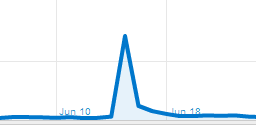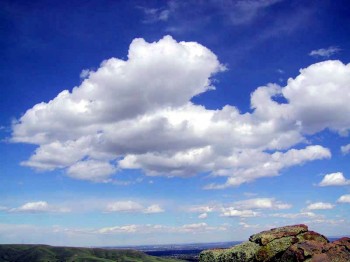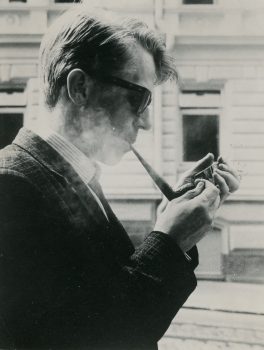Search results for "2011/04/2010/05/song-without-words"
Lucky strikes
12 August 2010 | This 'n' that

Stumbled upon: readers find Tommi Musturi's comic strip (June 10–June 18)
When Books from Finland was a printed journal, it was relatively easy to define its readership – now it is different: we are a part of the internet’s ecosystem, its surging and multifarious mass of knowledge.
Those who visit our pages may have the most diverse motives for wanting to read our articles – and they may travel surprising itineraries before arriving on Books from Finland’s pages, as we found out recently: StumbleUpon is still a fairly little-known service in Finland. Thus it took a while before we realised why so many of the comments about our piece on Tommi Musturi’s wordless comic strip, on colour and friendship, began with the words ‘I stumbled upon’… More…
Higher goals
31 December 1987 | Archives online, Fiction, Prose
An extract from the novel Tammerkosken sillalla (‘On Tammerkoski bridge’, 1982). Introduction by Panu Rajala
I had thought there were a lot of books in the libraries in Oulu. But both those libraries were totally overshadowed when, having climbed up to the top of the Messukylä Workers’ House, I began to cast my eyes along the bookshelves in the attic. A tallish and refined-looking librarian responded when I exclaimed aloud.
‘Just under seven thousand volumes altogether. Some of them are out on loan. We’d like to have a lot more books, but getting the money to buy them is like getting water from a stone.’
‘But you’ve already got an incredible amount compared to what we have in the rural library at home… In Taivalkoski during the war all we had was two cupboardsful.’
‘You didn’t have a lot of choice there,’ agreed the librarian. More…
The Mermaid Café
30 June 2000 | Archives online, poetry
From Cafe Sjöjungfrun (‘The Mermaid Cafe’, Söderströms, 1999). Introduction by Peter Mickwitz
Caesura
Yesterday we had the first evening of autumn
even though it is still July. The cool
moist darkness lights that seemed
softer, the Esplanade’s octagonal cone
lit up red, yellow and green above
the underground tunnel from restaurant
to hotel. In the row of lime trees
worn garlands began to show, more
than a third of their light bulbs gone, broken
lines of burning dots gently
swaying. Farther away
sun-bleached awnings, some oily
neon, it, too, segmented,
and people moving
at a calmer pace, already anonymous,
close to unreal reflected in glass panes,
entryways, street lamps shaped like big hooks.
Traffic noise becomes more explicit
as if in an echo chamber or does it
grow more dense as if we walked about
with yellowing wads of cotton in our ears
or a window or a door was closed
and voices a moment ago
distinct, or at least partly,
are transformed into a numb buzz,
all that remains of the message
are ups and downs, a caesura when the conversation, at regular intervals,
reaches a rhythmic point of rest.
Daughter of Cain
30 June 1985 | Archives online, Fiction, Prose
An extract from the novel Kainin tytär (‘Daughter of Cain’, 1984). In the following extract Anna and Risku spend a single night recalling the early days of their relationship; Anna is in the country, Risku is in the city. Introduction by Soila Lehtonen
Anna
The moon hangs before the bosom of the sky, a slender crescent, but giving light all the same.
On the horizon a black, glimmering line emerges from the water. It is the skerry, a low, lone rock.
I shut off the motor. The sea laps minutely against the side of the boat. This far out there are no longer any birds.
The silence here is deeper than even that of an empty room.
The skerry is as black and glistening as the back of a pike.
Light is matter, it’s never steady.
Whatever is understood in life is understood in a sudden blue illumination, like lightning cleaving the night to expose the landscape – shadows, hollows and all. More…
Conversations with a horse
31 December 2004 | Archives online, Fiction, Prose
Extracts from the novel Kiinalainen puutarha (‘The Chinese garden’, Otava, 2004). Introduction by Anna-Leena Nissilä
Colonel Mannerheim.
Near Kök Rabat, on the caravan route between Kashgar and Yarkand.
October 1906
It is growing dark. Let the others go on ahead. Let us wait here awhile. Perhaps the pain will go over. We’ll get through.
Steady, Philip.
You always obey. And listen. Your ears proudly, handsomely pricked.
Steady, I said, there in the garden. No reaction. Everyone was moving. Pure comedy. And something else.
An illusion, two girls. Then gone.
How to explain.
Before that. I had a conversation with Macartney, the British chargé d’affaires…
Pain…. It burns, now it burns again. Let us wait now, Philip. Steady, steady now. More…
Burgundian rain
30 September 1992 | Archives online, Fiction, poetry
from Burgundiska sviten (‘Burgundian suite’, Schildts, 1966). Introduction by Tuva Korsström
and if we could reach our Burgundian boundaries
you close to mine and I closer to yours than mine
and there see far beyond all boundaries
and there see jar beyond all shores
and there see far beyond all seas
and the ice blocks which this winter’s day
are brought heaving from below and the numbed cliffs
and ice-shattered shores vanish
and before us lies our open
quite open and naked sea More…
Poems
30 June 1985 | Archives online, Fiction, poetry
Introduction by Bo Carpelan
A flower beckons there, a secent beckons there, enticing my eye. A hope glimmers there. I will climb to the rock of the sky, I will sink in the wave: a wave-trough. I am singing tone, and the day smiles in riddles.
*
Like a sluice of the hurtling rivers I race in the sun: to capture my heart; to seize hold of that light in an inkling: sun, iridescence. In day and intoxication I wander. I am in that strength: the white, the white that smiles.
*
To my air you have come: a trembling, a vision! I know neither you nor your name. All is what it was. But you draw near: a daybreak, a soaring circle, your name.
Head in a cloud
27 May 2011 | Articles, Non-fiction
Thinking, reading, writing, buying… Teemu Manninen explores the new freedoms, literal and poetic, offered by cloud computing, where what you can do is no longer limited by what you happen to have on your computer

High in the sky: cumulus clouds. Photo: Michael Jastremski, Wikimedia
I’m sitting in a rocking chair on the porch of a cottage by a lake. My fingers tap and slide on the surface of a black glass panel, a kind of instrument used in the composing of literature. Each tap equals a letter, a series of taps equals a word, a symphony of taps becomes a paragraph, a paragraph an essay.
The glass panel remembers these letters and words and the writings they become, and knows them by their names, but it could also record anything I see or hear. I could even talk to it and it would understand my commands, as if some nether spirit were captured inside, a magic genie slaved to do my bidding. More…
The sea so open
30 September 2008 | Archives online, Fiction, poetry
Poems from Delta (Teos, 2008). Introduction by Jukka Koskelainen
Like wave-polished stones
we sit on a seashore rock, shading our eyes
from the sun, each other, the deltoid sails, the water.
You ask nothing more,
you know the sum of the angles of a triangle,
that you have your sides, as I do
sometimes they near each other
as if to penetrate each other, cut
a hole in the landscape.
A seagull settles on a crag,
without a glance aside, you’re up and disappear
from my side.
Sails, other sails.
the sea so open and the sky open. More…
Tiger in the grass
31 March 2001 | Fiction, Prose
Extracts from the novel Maan ääreen (‘To the end of the earth’, Otava, 1999)
I left Kronstadt at the end of October in the year 1868, when I was 22 years old.
The Mozart was a three-hundred-ton barque. Even on the journey to Tvedestrand in Norway I vomited yellow bile and my toes and fingers froze. We lingered in Tvedestrand for three months while the vessel was repaired in dock. To amuse myself, I drew and wrote an accurate description of the ship. That work ended up in the sea. From the harbour captain’s library I borrowed German books which dealt with geology and topology. Their reality was different from that of the law and the interpretation of its letter and spirit. When a topologist draws a map, it has to be true. Otherwise travellers will get lost, I thought childishly, as if it were possible to draw a line between true and true. More…



